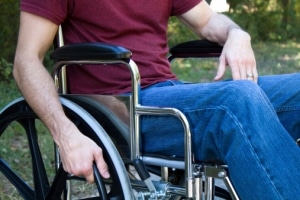
Earlier this year, we talked a bit about the spine, and the different ways you could end up with a spinal fracture or cracked vertebrae. We wanted to expand on that topic and discuss some of the effects of spinal cord injuries, and what you might expect if you or a loved one suffer a serious SCI.
The first thing you need to know is that spinal cord injuries are defined as complete and incomplete. A complete spinal cord injury, according to the Christopher and Dana Reeve Foundation, is one where a victim suffers from a “total lack of sensory and motor function below the level of injury.” This doesn’t mean that your nerves and axons have been severed (although that can happen in some kinds of accidents); it just means that those nerves and axons don’t function the way they are meant to function. An incomplete spinal cord injury, on the other hand, means that those nerves and axons are still functioning in some capacity, and “that the ability of the spinal cord to convey messages to or from the brain is not completely lost; some sensation and movement is possible below the level of injury.”
What leads to an SCI?
You can sustain a spinal cord injury if the actual bones of the spine are damaged in any way. According to the Mayo Clinic, the leading causes of SCI include:
- Auto accidents. Car, truck, motorcycle and motor vehicle accidents account for more than 35% of spinal cord injuries each year. A serious accident can fracture or crush the spine, tear or damage the nerves, or lead to paralysis via a traumatic brain injury.
- Falls. Around 25% of SCIs are related to falls, and it is the leading cause of injury for people over the age of 65.
- Violence. Acts of violence are cited as the root cause of SCI about 15% of the time.
- Sports-related injuries. About 9% of all SCIs are sports-related. The Mayo Clinic specifically mentions diving in shallow water and impact sports, which might include games like football, rugby, boxing and even mixed martial arts.
The remaining 10% of SCIs (give or take) can be caused by any number of reasons, such as diseases, crushing accidents or accidentally being hit by an object. The spine is strong, but it is not impenetrable – and people who suffer with spinal cord injuries could be left permanently paralyzed for the rest of their lives.
Treatments available for SCI victims
Science discovers new ways to help paralysis victims every day, but many of their treatments are still in the initial or experimental stages. Recent studies have shown progress through the use of electrical stimulation, but those therapies may not apply to all people, and have had mixed results: some people may be able to walk again, and others may not. Many SCI victims will rely on adaptive devices – like wheelchairs, for example – for the rest of their lives.
If you or your loved one is living with a debilitating spinal cord injury, you might be entitled to compensation to help you secure a brighter future. Delius & McKenzie, PLLC offers comprehensive legal counsel to personal injury victims throughout Tennessee. To speak with a Sevierville spinal cord injury attorney, please contact us. We are proud to serve clients in Pigeon Forge and Gatlinburg.

Attorney Bryan E. Delius was born and raised in Sevier County, TN. He founded Delius & McKenzie more than 20 years ago, after receiving his JD from the University of Tennessee at Knoxville. He is admitted in Tennessee and in several federal court systems. Learn more about Bryan E. Delius.




